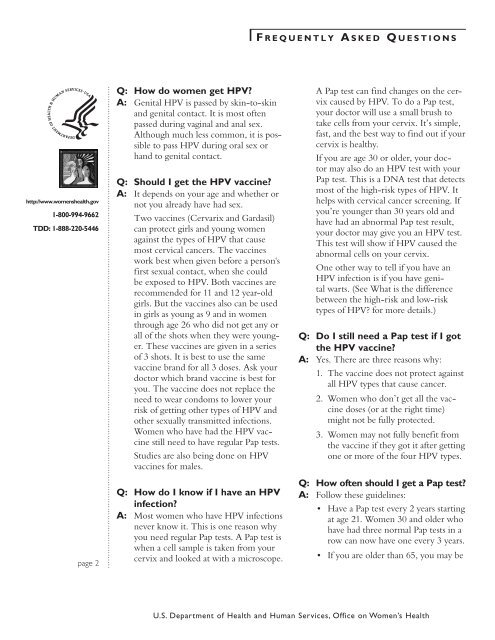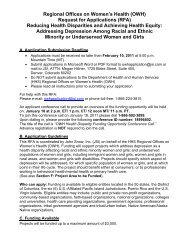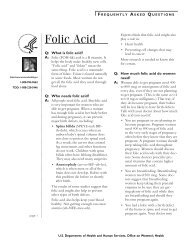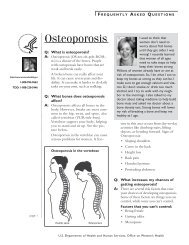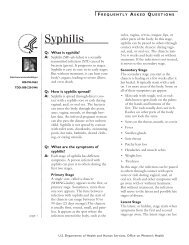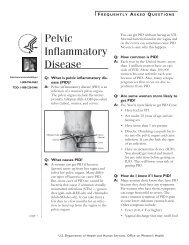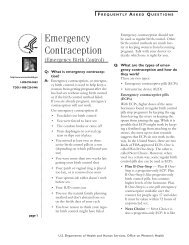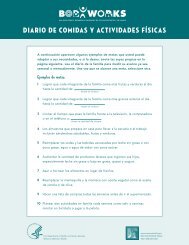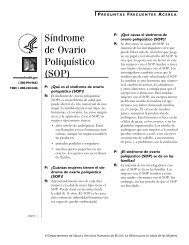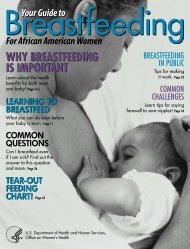Human Papillomavirus (HPV) and Genital Warts - WomensHealth.gov
Human Papillomavirus (HPV) and Genital Warts - WomensHealth.gov
Human Papillomavirus (HPV) and Genital Warts - WomensHealth.gov
Create successful ePaper yourself
Turn your PDF publications into a flip-book with our unique Google optimized e-Paper software.
F r e q u e n t l y As k e d Qu e s t i o n s<br />
http://www.womenshealth.<strong>gov</strong><br />
1-800-994-9662<br />
TDD: 1-888-220-5446<br />
page 2<br />
Q: How do women get <strong>HPV</strong>?<br />
A: <strong>Genital</strong> <strong>HPV</strong> is passed by skin-to-skin<br />
<strong>and</strong> genital contact. It is most often<br />
passed during vaginal <strong>and</strong> anal sex.<br />
Although much less common, it is possible<br />
to pass <strong>HPV</strong> during oral sex or<br />
h<strong>and</strong> to genital contact.<br />
Q: Should I get the <strong>HPV</strong> vaccine?<br />
A: It depends on your age <strong>and</strong> whether or<br />
not you already have had sex.<br />
Two vaccines (Cervarix <strong>and</strong> Gardasil)<br />
can protect girls <strong>and</strong> young women<br />
against the types of <strong>HPV</strong> that cause<br />
most cervical cancers. The vaccines<br />
work best when given before a person's<br />
first sexual contact, when she could<br />
be exposed to <strong>HPV</strong>. Both vaccines are<br />
recommended for 11 <strong>and</strong> 12 year-old<br />
girls. But the vaccines also can be used<br />
in girls as young as 9 <strong>and</strong> in women<br />
through age 26 who did not get any or<br />
all of the shots when they were younger.<br />
These vaccines are given in a series<br />
of 3 shots. It is best to use the same<br />
vaccine br<strong>and</strong> for all 3 doses. Ask your<br />
doctor which br<strong>and</strong> vaccine is best for<br />
you. The vaccine does not replace the<br />
need to wear condoms to lower your<br />
risk of getting other types of <strong>HPV</strong> <strong>and</strong><br />
other sexually transmitted infections.<br />
Women who have had the <strong>HPV</strong> vaccine<br />
still need to have regular Pap tests.<br />
Studies are also being done on <strong>HPV</strong><br />
vaccines for males.<br />
Q: How do I know if I have an <strong>HPV</strong><br />
infection?<br />
A: Most women who have <strong>HPV</strong> infections<br />
never know it. This is one reason why<br />
you need regular Pap tests. A Pap test is<br />
when a cell sample is taken from your<br />
cervix <strong>and</strong> looked at with a microscope.<br />
A Pap test can find changes on the cervix<br />
caused by <strong>HPV</strong>. To do a Pap test,<br />
your doctor will use a small brush to<br />
take cells from your cervix. It’s simple,<br />
fast, <strong>and</strong> the best way to find out if your<br />
cervix is healthy.<br />
If you are age 30 or older, your doctor<br />
may also do an <strong>HPV</strong> test with your<br />
Pap test. This is a DNA test that detects<br />
most of the high-risk types of <strong>HPV</strong>. It<br />
helps with cervical cancer screening. If<br />
you’re younger than 30 years old <strong>and</strong><br />
have had an abnormal Pap test result,<br />
your doctor may give you an <strong>HPV</strong> test.<br />
This test will show if <strong>HPV</strong> caused the<br />
abnormal cells on your cervix.<br />
One other way to tell if you have an<br />
<strong>HPV</strong> infection is if you have genital<br />
warts. (See What is the difference<br />
between the high-risk <strong>and</strong> low-risk<br />
types of <strong>HPV</strong>? for more details.)<br />
Q: Do I still need a Pap test if I got<br />
the <strong>HPV</strong> vaccine?<br />
A: Yes. There are three reasons why:<br />
1. The vaccine does not protect against<br />
all <strong>HPV</strong> types that cause cancer.<br />
2. Women who don’t get all the vaccine<br />
doses (or at the right time)<br />
might not be fully protected.<br />
3. Women may not fully benefit from<br />
the vaccine if they got it after getting<br />
one or more of the four <strong>HPV</strong> types.<br />
Q: How often should I get a Pap test?<br />
A: Follow these guidelines:<br />
• Have a Pap test every 2 years starting<br />
at age 21. Women 30 <strong>and</strong> older who<br />
have had three normal Pap tests in a<br />
row can now have one every 3 years.<br />
• If you are older than 65, you may be<br />
U.S. Department of Health <strong>and</strong> <strong>Human</strong> Services, Office on Women’s Health


